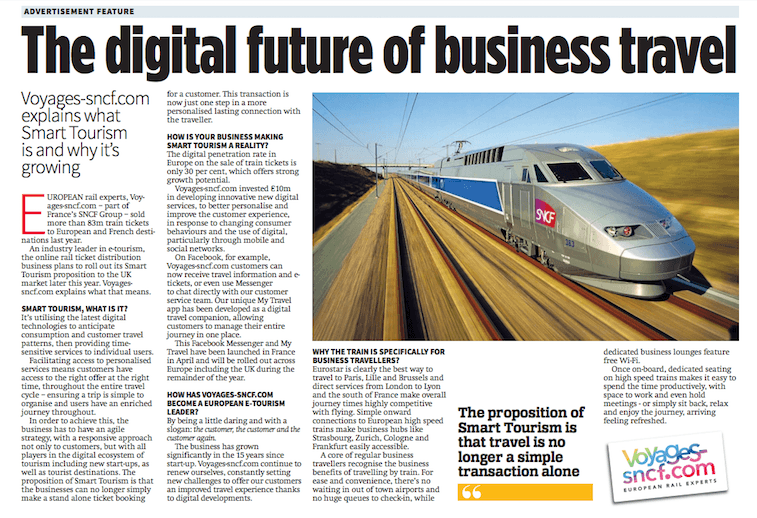Wouldn’t you love it if you could use your commute to save time to allow more personal time with the people and/or pastimes you love?* It turns out (courtesy of Lisette Sutherland) that freedom from the commute is the #1 reason why people like to work remotely. That said, if you can work on the train (i.e. remotely), you are possibly/hopefully reducing the amount of work you have to do at the office. Personally, I am a frequent traveller on the Eurostar and really enjoy its speed and general punctuality. Naturally, I also am interested in and attuned to the digital experience. If Eurostar had a good wifi, then I could work for an unadulterated 2 hours… but, alas, that is not the case.
In any event, back to the topic (and post title) of great advertising copy! I was absolutely dumbstruck by a new ad by Voyages-sncf.com. The below ad was an “advertisement feature” in today’s CITY AM (in London). The title of the article, which is nearly 550 words long, is “The digital future of business travel.” To my mind, the copywriting in this advertorial is an exercise in how not to write great advertising copy.

Copywriting faux pas
Assuming the intended reader of this article is a business traveler, the article has a litany of errors:
- The subtitle about Smart Tourism is totally off key with the title about Business Travel! I start off totally confused. Unless I am wrong, business travel is not intended as tourism?
- The opening sentence is a whole lot of stats about Voyages-sncf, reinforcing its positioning in eTourism (images of families and noisy tourists come to mind). Where is the customer benefit?
- There is even a spelling mistake: “stand alone” (see Grammar). [I might quibble on some other grammatical points — such as “a core … recognise” — but, we can save that for a grammaticians’ forum!]
- Phrasing is vague. I frowned hard trying to figure out what is meant by the sentence: “The proposition of Smart Tourism is that travel is no longer a simple transaction alone.” What does that mean and where is the proposition in that phrase?
- They write they are customer centric, but they seem to have forgotten the customer’s point of view in this article. They answer the question of how they have managed to become #1 with the rather corny declaration: “By being a little daring and with a slogan: the customer, the customer and the customer again.” Outside of their having been a monopoly, I, for one, continue to suffer from a lack of wifi onboard… Lack of wifi/internet connection is a strategic issue, not just an anecdote for business travellers. Share on X N.B. Not everyone can afford the high roaming costs when traveling abroad. They casually write at the end of the article that their “dedicated business lounges feature free Wi-Fi.” They omit to say that there is no wifi onboard, which is where you most want it! Moreover, if you have ever experienced the new Eurostar train carriages (or read my article on the topic), you will see that the customer came dead last in the design and development of these super expensive trains.
- For business travellers, customer service is bound to be a key preoccupation. The term “customer service” is cited once, and only in reference to Facebook Messenger. Especially for the readership of City AM, I hardly believe the audience will be likely to benefit from that service.
Overall, I was left entirely confused at whom Voyages-sncf was aiming this article. Furthermore, I suspect that the original article was in French and this one suffered from being a little lost in translation?
4 Tips For Great Advertising Copy
- Make the article engaging. Include some emotion, a story, even a drawing; and/or reduce the amount of text that you are trying to cram into the article.
- Make it clear for whom the article is intended (and make sure the copy follows suit).
- Don’t lead with just information about yourself. Find ways to bring in the point of view of the reader. Make the reader know you understand their context.
- Don't say what you are. Show it. Share on X E.g. Don’t write you are customer centric, prove it.
Some snarly comments to begin with, but hopefully you found the tips at the end constructive and useful?
Happy to receive your comments (negative or otherwise!).
*I purposefully led off with a story that may have felt out of left field… But, hopefully you will have found the journey worthwhile! I was trying to walk the talk and create a form of engagement with this text… Did it work for you?











